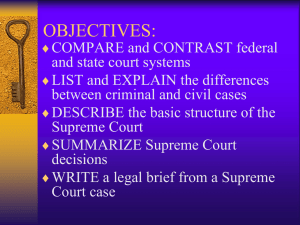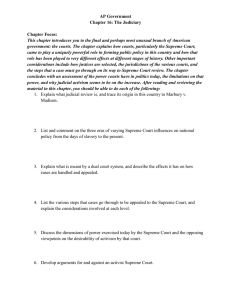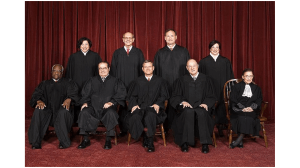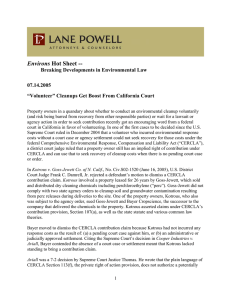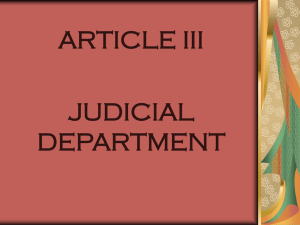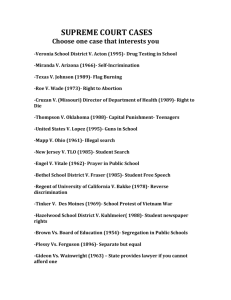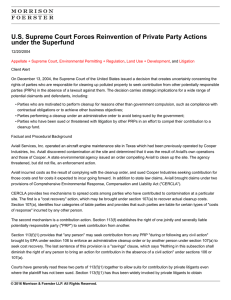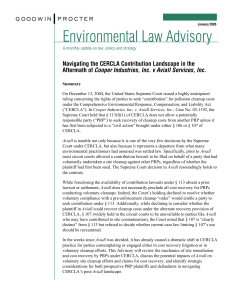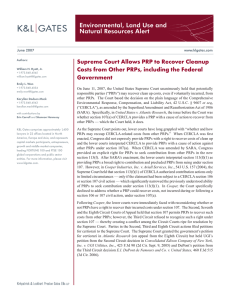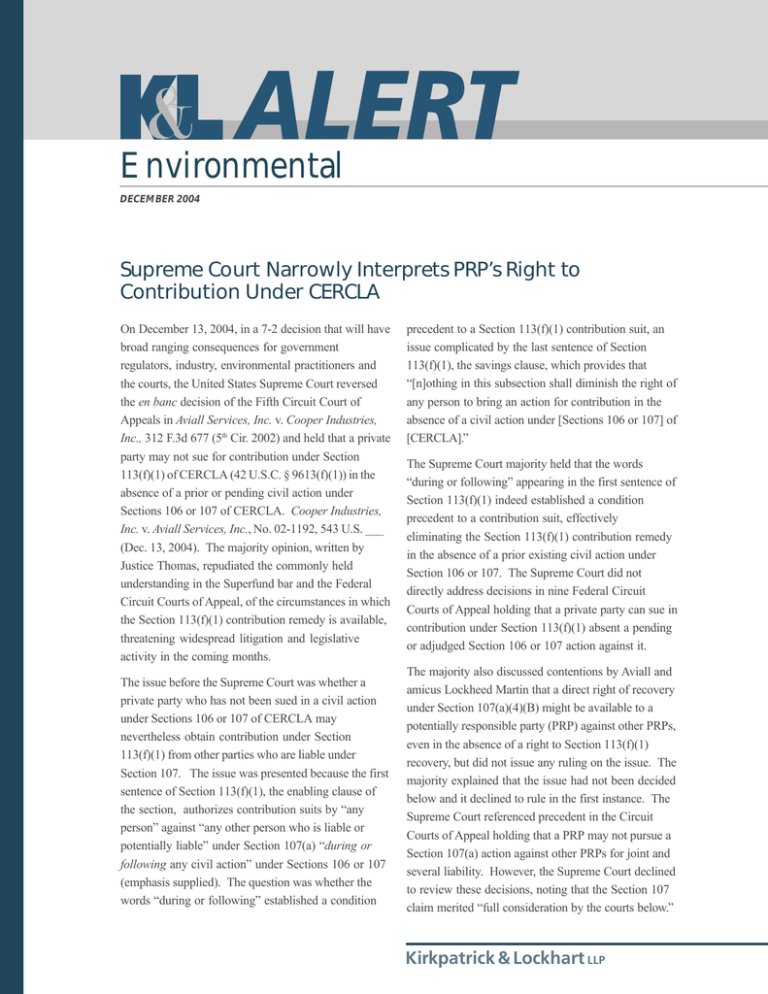
Environmental
DECEMBER 2004
Supreme Court Narrowly Interprets PRP’s Right to
Contribution Under CERCLA
On December 13, 2004, in a 7-2 decision that will have
broad ranging consequences for government
regulators, industry, environmental practitioners and
the courts, the United States Supreme Court reversed
the en banc decision of the Fifth Circuit Court of
Appeals in Aviall Services, Inc. v. Cooper Industries,
Inc., 312 F.3d 677 (5th Cir. 2002) and held that a private
party may not sue for contribution under Section
113(f)(1) of CERCLA (42 U.S.C. § 9613(f)(1)) in the
absence of a prior or pending civil action under
Sections 106 or 107 of CERCLA. Cooper Industries,
Inc. v. Aviall Services, Inc., No. 02-1192, 543 U.S. ___
(Dec. 13, 2004). The majority opinion, written by
Justice Thomas, repudiated the commonly held
understanding in the Superfund bar and the Federal
Circuit Courts of Appeal, of the circumstances in which
the Section 113(f)(1) contribution remedy is available,
threatening widespread litigation and legislative
activity in the coming months.
The issue before the Supreme Court was whether a
private party who has not been sued in a civil action
under Sections 106 or 107 of CERCLA may
nevertheless obtain contribution under Section
113(f)(1) from other parties who are liable under
Section 107. The issue was presented because the first
sentence of Section 113(f)(1), the enabling clause of
the section, authorizes contribution suits by “any
person” against “any other person who is liable or
potentially liable” under Section 107(a) “during or
following any civil action” under Sections 106 or 107
(emphasis supplied). The question was whether the
words “during or following” established a condition
precedent to a Section 113(f)(1) contribution suit, an
issue complicated by the last sentence of Section
113(f)(1), the savings clause, which provides that
“[n]othing in this subsection shall diminish the right of
any person to bring an action for contribution in the
absence of a civil action under [Sections 106 or 107] of
[CERCLA].”
The Supreme Court majority held that the words
“during or following” appearing in the first sentence of
Section 113(f)(1) indeed established a condition
precedent to a contribution suit, effectively
eliminating the Section 113(f)(1) contribution remedy
in the absence of a prior existing civil action under
Section 106 or 107. The Supreme Court did not
directly address decisions in nine Federal Circuit
Courts of Appeal holding that a private party can sue in
contribution under Section 113(f)(1) absent a pending
or adjudged Section 106 or 107 action against it.
The majority also discussed contentions by Aviall and
amicus Lockheed Martin that a direct right of recovery
under Section 107(a)(4)(B) might be available to a
potentially responsible party (PRP) against other PRPs,
even in the absence of a right to Section 113(f)(1)
recovery, but did not issue any ruling on the issue. The
majority explained that the issue had not been decided
below and it declined to rule in the first instance. The
Supreme Court referenced precedent in the Circuit
Courts of Appeal holding that a PRP may not pursue a
Section 107(a) action against other PRPs for joint and
several liability. However, the Supreme Court declined
to review these decisions, noting that the Section 107
claim merited “full consideration by the courts below.”
Kirkpatrick & Lockhart LLP
The majority further took issue with the dissent’s view
(by Ginsburg, J.) that the decision in Key Tronic Corp.
v. United States, 511 U.S. 809 (1994) supported a
conclusive determination that a right of recovery under
Section 107(a)(4)(B) would be available to a
potentially responsible party. The Supreme Court
majority stated that Key Tronic did not sufficiently
address the relationship between Section 107 and
Section 113, or the relevance of Key Tronic’s status as
a PRP, to justify such a determination without fuller
examination by the lower courts.
Similarly, the Supreme Court also declined to decide
whether Aviall had an implied right to contribution
under Section 107. The Supreme Court again
referenced precedent suggesting that such an implied
right of contribution would not be available in the
aftermath of the passage of the Superfund Amendments
and Reauthorization Act of 1986 (SARA), but did not
rule on the issue. Thus, while the Supreme Court held
that Section 113(f)(1) authorizes contribution claims
only “during or following” a civil action under Section
106 or 107, it also held open the door to other
contribution claims in its description of the last
sentence of Section 113(f)(1) as rebutting any
FOR MORE INFORMATION about this Alert or Kirkpatrick &
Lockhart’s environmental practice, please contact the author or
one of the K&L office contacts below. You may also visit our
website at www.kl.com.
Michael DeMarco
Robert Everett Wolin
R. Timothy Weston
Frederick J. Ufkes
Daniel A. Casey
William H. Hyatt, Jr.
Donald W. Stever
Richard W. Hosking
Edward P. Sangster
Barry M. Hartman
Boston
Dallas
Harrisburg
Los Angeles
Miami
Newark
New York
Pittsburgh
San Francisco
Washington
617.951.9111
214.939.4909
717.231.4504
310.552.5079
305.539.3324
973.848.4045
212.536.4861
412.355.8612
415.249.1028
202.778.9338
mdemarco@kl.com
rwolin@kl.com
tweston@kl.com
fufkes@kl.com
dcasey@kl.com
whyatt@kl.com
dstever@kl.com
rhosking@kl.com
esangster@kl.com
bhartman@kl.com
presumption that the first clause was the exclusive cause
of action for contribution available to a PRP.
Both the determination that a Section 113(f)(1) right to
contribution is not available to a private party who has
not been sued under CERCLA Sections 106 or 107, and
the references to possible rights of recovery under Section
107 meriting further review by the courts below, will have
immediate and significant effects on a wide range of
entities. It is unclear, for example, whether the Supreme
Court’s decision is retroactive to the numerous pending
litigations where recovery in contribution has been
sought without a pending “civil action.” Also, the precise
limits of the “civil action” now requisite to sue under
Section 113(f)(1) are unclear. PRPs currently or
potentially asserting or defending these claims cannot at
this time conclusively evaluate whether this includes
voluntary cleanup contracts provided for in many state
programs, or an administrative order under Section 106.
The Aviall Services decision clearly raises uncertainty for
any private company currently involved in or considering
a voluntary cleanup. The decision will also influence
how the United States Environmental Protection Agency
and its state counterparts address and prioritize cleanup
activities.
While private parties, regulators, and environmental
practitioners consider the diverse and complex issues and
choices raised by the Supreme Court’s decision in Aviall
Services, there exists, too, the possibility that Congress
will be moved to revise the CERCLA legislation entirely.
The possible content and scope of a potential legislative
overhaul – and the role regulators, industry
representatives and environmental interest groups might
play in such a review – only raises more uncertainty.
WILLIAM HYATT, JR.
whyatt@kl.com
973.848.4045
The attorneys resident in all offices, unless otherwise indicated,
are not certified by the Texas Board of Legal Specialization.
®
Kirkpatrick & Lockhart LLP
Challenge us. ®
www.kl.com
BOSTON
■
DALLAS
■
HARRISBURG
■
LOS ANGELES
■
MIAMI
■
NEWARK
■
NEW YORK
■
PITTSBURGH
■
SAN FRANCISCO
■
WASHINGTON
.........................................................................................................................................................
This bulletin is for informational purposes and does not contain or convey legal advice. The information herein
should not be used or relied upon in regard to any particular facts or circumstances without first consulting a lawyer.
© 2004 KIRKPATRICK & LOCKHART LLP.
ALL RIGHTS RESERVED.

